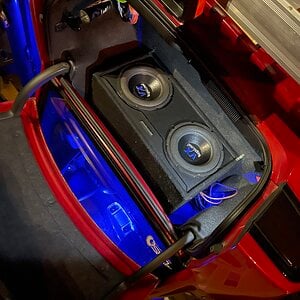Fuses work by breaking when they get hot. That one's set to break at 150A. Every wire is a resistor, so are fuses. Fuses are designed to be the highest resistance point on the wire so that no heat builds up elsewhere. Also heat raises resistance. Putting 2 raises the resistance more than a plain wire for no safety benefit. Parallel fuses = fine, series fuses = why?
The resistance rise is quite small for the most part, especially at low amperage, but there's no explanation for its existence. The + cable fuse will blow first in identical fuses due to voltage drop and both might be damaged.


